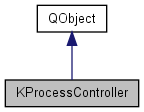KDECore
KProcessController Class Reference
Used internally by KProcess. More...
#include <kprocctrl.h>

Public Member Functions | |
| void | addKProcess (KProcess *) |
| void | addProcess (int pid) |
| int | notifierFd () const |
| void | removeKProcess (KProcess *) |
| void | rescheduleCheck () |
| void | unscheduleCheck () |
| bool | waitForProcessExit (int timeout) |
Static Public Member Functions | |
| static void | deref () |
| static void | ref () |
| static void | theSigCHLDHandler (int signal) |
Static Public Attributes | |
| static KProcessController * | theKProcessController |
Detailed Description
Used internally by KProcess.
For internal use only.
A class for internal use by KProcess only. -- Exactly one instance of this class is created by KApplication.
This class takes care of the actual (UN*X) signal handling.
Definition at line 39 of file kprocctrl.h.
Member Function Documentation
| void KProcessController::addKProcess | ( | KProcess * | p | ) |
| void KProcessController::addProcess | ( | int | pid | ) |
| void KProcessController::deref | ( | ) | [static] |
Destroy the instance if one exists and it is not referenced any more.
Called by KApplication::~KApplication()
Definition at line 48 of file kprocctrl.cpp.
| int KProcessController::notifierFd | ( | ) | const |
Definition at line 165 of file kprocctrl.cpp.
| void KProcessController::ref | ( | ) | [static] |
Create an instance if none exists yet.
Called by KApplication::KApplication()
Definition at line 39 of file kprocctrl.cpp.
| void KProcessController::removeKProcess | ( | KProcess * | p | ) |
| void KProcessController::rescheduleCheck | ( | ) |
This function must be called at some point after calling unscheduleCheck().
- Since:
- 3.2
Definition at line 178 of file kprocctrl.cpp.
| void KProcessController::theSigCHLDHandler | ( | int | signal | ) | [static] |
Automatically called upon SIGCHLD.
Never call it directly. If your application (or some library it uses) redirects SIGCHLD, the new signal handler (and only it) should call the old handler returned by sigaction().
For internal use only.
Definition at line 147 of file kprocctrl.cpp.
| void KProcessController::unscheduleCheck | ( | ) |
Call this function to defer processing of the data that became available on notifierFd().
- Since:
- 3.2
Definition at line 170 of file kprocctrl.cpp.
| bool KProcessController::waitForProcessExit | ( | int | timeout | ) |
Wait for any process to exit and handle their exit without starting an event loop.
This function may cause KProcess to emit any of its signals.
- Parameters:
-
timeout the timeout in seconds. -1 means no timeout.
- Returns:
- true if a process exited, false if no process exited within
timeoutseconds.
- Since:
- 3.1
Definition at line 223 of file kprocctrl.cpp.
Member Data Documentation
Only a single instance of this class is allowed at a time, and this static variable is used to track the one instance.
Definition at line 60 of file kprocctrl.h.
The documentation for this class was generated from the following files:
 KDE 3.5 API Reference
KDE 3.5 API Reference